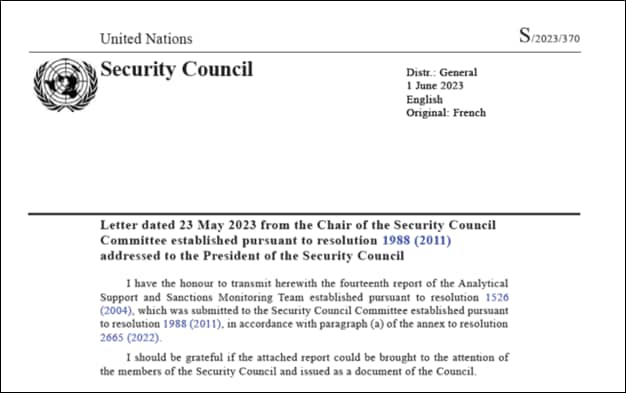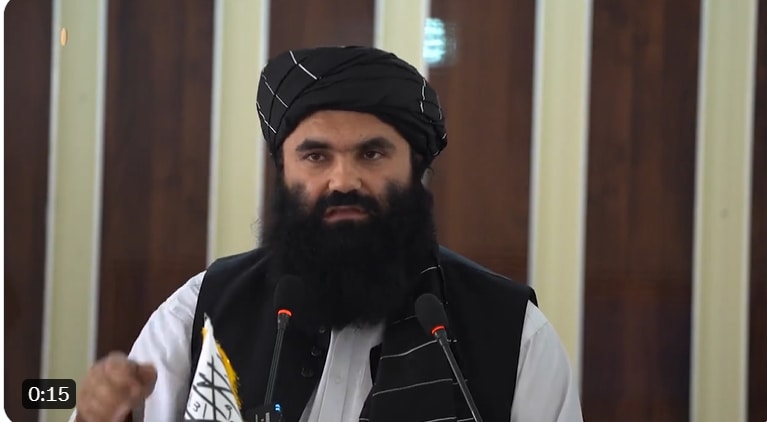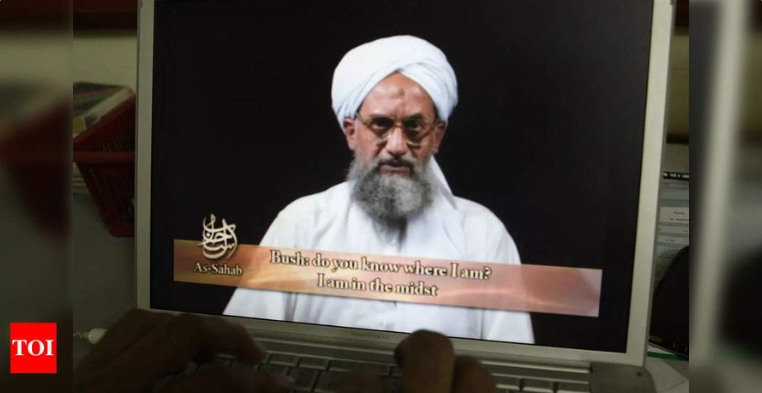In its annual report, the United Nations Security Council has warned that there has been no material changed in the support of the Islamic Emirate of Afghanistan (IEA, i.e., the Afghan Taliban) for jihadi terror organizations such as Al-Qaeda, Tehreek-e-Taliban Pakistan (TTP), and others, while some Al-Qaeda leaders are serving in the Taliban government.
Report No. S/2023/370 – titled "Fourteenth Report Of The Analytical Support And Sanctions Monitoring Team Submitted Pursuant To Resolution 2665 (2022) Concerning The Taliban And Other Associated Individuals And Entities Constituting A Threat To The Peace Stability And Security Of Afghanistan" – was published on June 1, 2023.[1]

A screenshot from the UN Security Council Report
Al-Qaeda Commanders Serving In The Taliban Government
The report says: "With the patronage of the Taliban, Al-Qaeda members have received appointments and advisory roles in the Taliban security and administrative structures." It identifies Al-Qaeda members serving in the Taliban government. One Al-Qaeda member is serving as a training director at the Defense Ministry, while training was based on Al-Qaeda manuals being openly used at the ministry's facilities. Two provincial governors of the Taliban government are affiliated with Al-Qaeda: Qari Ehsanullah Baryal, the current Governor of Kapisa and former governor of Kabul; and Hafiz Muhammad Agha Hakeem, governor of Nuristan; Tajmir Jawad, another Taliban associated with Al-Qaeda, is the Deputy Director of the General Directorate of Intelligence (the Taliban government's intelligence agency).
Noting that since August 2021 when the Taliban took control of Afghanistan, senior Al-Qaeda leaders such as Mohamed Abbatay aka Abd Al-Rahman Al-Maghrebi "were reported to have travelled between Afghanistan and the Islamic Republic of Iran" the report says that the de facto leader Mohammed Salahaldin Abd El Halim Zidane aka Sayf Al-Adl had "travelled from his base in the Islamic Republic of Iran to Afghanistan and back in November 2022."
Taliban Rulers Pay Salaries To Al-Qaeda Commanders As Al-Qaeda Runs Terror Training Camps
The report observes: "[T]he Taliban provided Al-Qaeda with monthly 'welfare payments,' with portions of those payments filtered down to fighters of Al-Qaida-affiliated groups." It adds: "Over the past year, the de facto Ministry of Interior [headed by Sirajuddin Haqqani, who is on the FBI's Most Wanted List] continued its distribution of Afghan passports and tazkiras (national identity cards) to Al-Qaeda members with advisory roles in main Afghan cities."
According to the report, the number of Al-Qaeda's core members remains 30-60 and comprise "mainly senior figures located in Kabul, Kandahar, Helmand, and Kunar." It is notable that Al-Qaeda leader Ayman Al-Zawahiri was living in a safe house in Kabul where he was killed in a U.S. drone strike on July 31, 2022. The report goes on to estimate that Al-Qaeda jihadi fighters in Afghanistan are "estimated to be 400, reaching 2,000 with family members and supporters included, operating in the south (Helmand, Zabul and Kandahar Provinces), center (Ghazni, Kabul and Parwan) and east (Kunar, Nangarhar and Nuristan)."
Contrary to their promises to the international community, Taliban rulers have allowed Al-Qaeda to establish and run training camps. "The group has established new training camps in Badghis, Helmand, Nangarhar, Nuristan and Zabul, with safe houses in Farah, Helmand, Herat and Kabul," the report says, adding that 20-25 Arab jihadi fighters arrived "in Kunar and Nuristan, where the location of a camp was stated to be specifically for the training of suicide bombers, accompanied by a new Al-Qaeda media apparatus being established in Herat."
The Afghan Taliban government is fully aware of these activities. The report notes that Al-Qaeda within Afghanistan is "overseen and monitored by Department 12 of the General Directorate of Intelligence [GDI], which also monitors the presence and activities of all foreign fighters." The GDI is the Taliban government's intelligence agency.
According to the report, the 2021 release of Abu Ikhlas Al-Masri by the new Taliban government was meant as "the facilitating factor for the Katiba Umer Farooq Unit being reactivated in Kunar Province." The unit's deputy commander is Abu Hamza Al-Qahtani and four operatives are Sheikh Abdul Hakim Al-Masri, Qital Al-Hijazi, Abu Basir, and Abu Yusuf aka Talha Al-Saudi, it says.
Al-Qaeda in the Indian Subcontinent (AQIS), a branch of Al-Qaeda aimed at targeting India, "has approximately 180 to 200 fighters," with Osama Mehmood as its emir, Atif Yahya Ghouri as the deputy emir and Muhammad Maruf being responsible for recruitment, the report notes, adding that AQIS has its main bases in Kandahar, Nimruz, Farah, Helmand, and Herat provinces and "is actively supporting TTP [Tehreek-e-Taliban Pakistan]."
SUPPORT OUR WORK

Afghan Taliban's Ties With Tehreek-e-Taliban Pakistan And Other Jihadi Groups
The Tehreek-e-Taliban Pakistan (TTP) is an organization of Pakistani jihadis, which sent many "martyrdom-seeking" bombers to the Islamic Emirate during its 20-year jihad against U.S. and NATO troops in Afghanistan. Following the Afghan Taliban's takeover of power in Kabul, the TTP emir Mufti Noor Wali Mehsud formally described TTP as a branch of the Islamic Emirate, which now rules Afghanistan.[2] His announcement was not new because leaders of TTP and Al-Qaeda have always offered bay'a ("oath of allegiance") to the emir of the Afghan Taliban. According to the report, the Afghan Taliban do "not consider TTP a threat to Afghanistan, but rather as part of the Emirate."

Interior Minister Sirajuddin Haqqani's ministry issues passports to Al-Qaeda members
According to the UN report, Afghan Taliban "have harbored and allowed active support of TTP," despite the Pakistani government routinely criticizing the new rulers of Kabul for allowing TTP to launch terror attacks inside Pakistani territory from Afghan soil. The report also says the Afghan Taliban "also retain traditional ties to most regional terrorist entities, including the Islamic Movement of Uzbekistan (IMU), Eastern Turkestan Islamic Movement, also known as the Turkestan Islamic Party (ETIM/TIP), and Jamaat Ansarullah (JA)."
During the year under consideration from mid-2022 onward, the report notes, "Al-Qaeda members trained and supplied ideological guidance to TTP fighters in suicide bomber training camps in Kunar province."
The report also mentions, contrary to the Afghan Taliban's insistence that there are no foreign terrorist groups in Afghanistan other than ISKP, that "approximately 20 groups [are] operating in the country, enjoying freedom of movement under the Taliban's protection and the General Directorate of Intelligence's oversight."
Of the organizations present in Afghanistan, TTP is certainly the largest jihadi organization. According to the report, "the estimated strength of TTP in Afghanistan is 4,000 to 6,000 fighters, based mainly in the eastern provinces of Nangarhar, Kunar, Logar, Paktika, Paktia and Khost. Its leader, Mufti Noor Wali Mehsud and deputy Qari Amjad Ali are based in Paktika and Kunar provinces, respectively. Since the reunification with several splinter groups, TTP has aspired to re-establish control of territory in Pakistan after being emboldened by the Taliban takeover in Afghanistan. Jamaatul Ahrar retained some independence even after its merger into TTP in 2020 as one of its most active groups."
Regarding the Eastern Turkestan Islamic Movement, which is also known as the Turkestan Islamic Party (ETIM/TIP), the UN report says the number of their fighters "vary between 300 and 1,200 fighters" while ETIM/TIP "continued to acquire weapons and created new bases in Afghanistan." It also observes that Abdul Haq and other ETIM/TIP members "received Afghan passports and identity documents (tazkiras) in 2022, enabling their potential infiltration into neighboring countries." The ETIM/TIP "actively expanded the scope of its operations and built operational bases and armories in Baghlan province, while retaining its presence in Badakhshan, Takhar, Kunduz, Baghlan, Logar and Sar-e-Pul provinces," the report states.
It is known that all these jihadi organizations, since the 1980s, have developed strong linkages. Regarding Jamaat Ansarullah (JA), an Al-Qaeda affiliate, the report notes: "JA remains closely affiliated with Al-Qaeda in a symbiotic relationship with the [Afghan] Taliban, fighting alongside their special forces, the Badri 313 Battalion, in numerous offensives against the National Resistance Front, including the one conducted in October 2022 in Badakhshan Province."

Al-Qaeda leader Ayman Al-Zawahiri was killed at a safe house in Kabul
It says that JA has "some 100 to 250 fighters, located mainly in Badakhshan, Kunduz and Takhar Provinces under the command of its new leader, Asliddin Khairiddinovich Davlatov alias Mawlawi Ibrahim. The Taliban deployed JA fighters in Badakhshan led by Mohammad Sharifov alias Mahdi Arsalon, a Tajik national." The Afghan Taliban government also "issued Afghan passports to the JA leader and 30 of its fighters."
The report also notes that the Islamic Movement of Uzbekistan (IMU) has 150 to 550 fighters, led by the new emir, Mamasoli Samatov alias Abu Ali, an Uzbek national. Khatiba Imam Al-Bukhari, a group established in 2011 by fighters who split from IMU, "has approximately 80 to 100 fighters led by Dilshod Dekhanov in Badghis, Badakhshan, Faryab and Jowzjan provinces."
The Islamic Jihad Group, headed by Ilimbek Mamatov, is present in Badakhshan, Baghlan, Kunduz, and Takhar with some 200 to 250 members, the report says, adding that Khatiba Imam Al-Bukhari and Islamic Jihad Group are "subservient to the [Afghan] Taliban."
It should be noted that in June 2022 a new organization was established under the name of Tehrik-e-Taliban Tajikistan (TTJ), which "aims to establish shari'a rule in Tajikistan while overthrowing the secular government of Tajikistan," according to the report. The TTJ group has "some 140 fighters, comprising Tajik nationals and Afghan ethnic Tajiks, based in the northern provinces of Afghanistan."
The Islamic State Khurasan Province (ISKP) Fighters Number About 4,000-6,000
The Islamic State's Khurasan Province (ISKP) has emerged as a major challenger to the Afghan Taliban regime. The UN report notes that ISKP claimed "more than 190 suicide bomb attacks against soft and hard targets in major cities [in Afghanistan], leaving some 1,300 people dead or injured" over the past year, and poses a serious threat to Afghanistan, the region, and Central Asia.
According to the report, ISKP "organizational structure has evolved from a hierarchical to a network-based system to boost its strength and fend off attacks as part of a five-year plan with short-term and long-term objectives. Sanaullah Ghafari aka Shahab Al-Muhajir is viewed as the most ambitious leader of the affiliate." The report notes that Ghafari differs from previous ISKP leaders in that he is "well educated and has recruited more educated individuals and extended recruitment to non-Salafists."

The UN report confirms that the Afghan Taliban consider TTP to be part of their emirate. TTP emir Mufti Noor Wali Mehsud has united many groups under the TTP.
According to the report, the ISKP fighters are estimated to be "from 4,000 to 6,000 (including family members), including Afghans and nationals of Azerbaijan, the Islamic Republic of Iran, Pakistan, the Russian Federation, Türkiye and Central Asian countries and a small number of Arab fighters who travelled from the Syrian Arab Republic to Afghanistan in the past year." It says that ISKP has established "training camps and strongholds" mainly in the north – Baghlan, Balkh, Jowzjan, Kunduz and Faryab provinces – northeast – Badakhshan and Takhar – and east – Kunar, Nangarhar, Nuristan, Paktika, Paktia and Khost – with at least five new ones built in 2022.
According to the report, the ISKP also "recruited Tajik suicide bombers who travelled from Dushanbe to Tehran and entered Afghanistan through Herat and Nimroz to conduct terrorist attacks in the country." One such suicide bomber was Abu Muhammad Al-Tajiki, who executed a suicide bombing in a temple of Hindus and Sikhs in Kabul in June 2022.
The ISKP has also developed "a network of sleeper cells in the center of the country (Kabul, Kapisa and Parwan)," it says, adding that elsewhere ISKP operates in "cells of 5 to 15 people." The UN report says that ISKP has an organized campaign "to recruit TTP members, Uyghurs and ethnic Tajik and Uzbek minorities, which prompted reports of Islamic Movement of Uzbekistan units secretly pledging allegiance to ISIL (Daesh) while remaining under the Taliban umbrella and biding their time."
The nature of the threat to the region and the world is compounded by the fact that these jihadi organizations now possess vast stockpiles of arms and ammunition, though most of these are under the Taliban regime. The report estimates that the U.S. and NATO militaries left "approximately half a million rounds of various types of ammunition, 350,000 automatic weapons, 70,000 armored vehicles, 20 assault aircraft, 4 transport aircraft and more than 100 helicopters, collectively valued at $8.5 billion. Key stockpile locations include Balkh, Jalalabad, Kunduz, and Kabul. Member States note, however, that NATO weaponry is sensitive to wear and tear and difficult to maintain and that its ammunition is expensive and challenging to source."
* Tufail Ahmad is Senior Fellow for the MEMRI Islamism and Counter-Radicalization Initiative. Yigal Carmon is President of MEMRI.
[1] Documents-dds-ny.un.org, accessed June 10, 2023. The original English of the quoted texts in this dispatch has been lightly edited for standardization and clarity.
[2] MEMRI JTTM Report, Pakistani Taliban Emir Mufti Noor Wali Mehsud Says TTP Is Branch Of The Islamic Emirate Of Afghanistan, Travels Through Pakistan's Border Regions, December 21, 2021.




